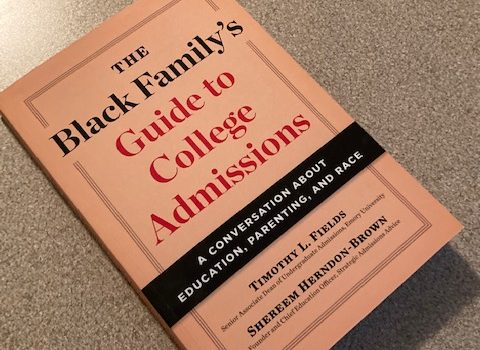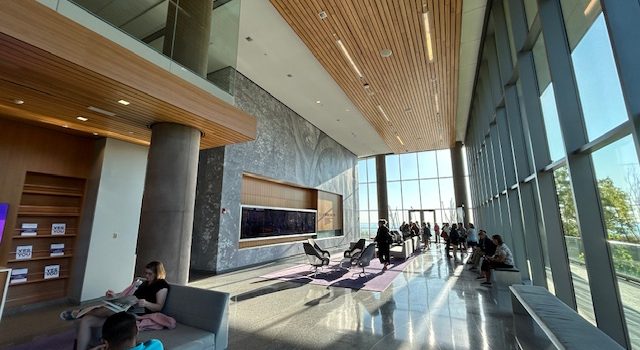Book Review: The Black Family’s Guide to College Admissions
Co-authored by Timothy Fields, Senior Associate Dean of Admissions at Emory University and Shereem Herdon-Brown, an independent college admissions advisor, this book speaks directly to Black families.
The Black Family’s Guide to College Admissions defines success in the admissions process just as I do: that students and their families should have choices.
Today more college-going Black students are drown towards PWIs. But more recently, the co-authors write, there is more interest in HBCUs as supportive student communities. HBCUs have been historically underfunded. But Black students who attend HBCUs have mentioned a higher level of satisfaction with their education vs. those who attend PWIs.
The co-authors grouped college-going Black parents into three thought processes.
- PWI’s are better than HBCUs; they are more like the “real world.”
- The HBCU experience is one that should not be missed. One word that I read and heard when I reviewed Spelman College was transformational. Another that the co-authors use is familial.
- College choice should be based on costs, location, majors and family fit
Fields and Herndon-Brown acknowledge that the admissions process favors families that focus on advanced courses, high scores on standardized tests and distinctive extracurricular activities.
They also added that affluent Black applicants who bring strengths in all three are not advantaged in selective admissions. Diversity in admissions considers not only race, geographic location and sexual orientation; it also considers socioeconomic status. Promising first-generation applicants who have achieved despite more limited encouragement and resources are highly sought in selective admissions, especially those with special talents in academics, the arts or athletics.
The Black Family’s Guide to College Admissions encourages less certain families to visit HBCUs and PWIs.
This is especially relevant when both are in the same city. For example, I have reviewed Agnes Scott College, a women’s college in the Atlanta area that is 40 percent Black, as well as Spelman, which is also a women’s college. Both are very good schools with strengths in STEM, humanities and the social sciences. The co-authors of The Black Family’s Guide to College Admissions mention Agnes Scott as one of the more supportive PWIs as well. As another example, Black student who is interested in national politics might want to check out not only Howard University as well as several other schools in and around Washington DC. Fields and Herndon Brown listed several PWIs in and near the nation’s capital that would be worth checking out.
The co-authors consider the liberal arts to be a “luxury.”
They encourage Black students to take courses that would enable them to build a more secure financial future. I agree to some point. But there are business and quantitative skills that students can learn without pursuing a business degree. The co-authors were also concerned about entering college undecided on possible majors. However, there are many colleges that make it fairly easy to get to a major within four semesters. But I need to add that it is becoming more difficult to enter programs in business, computer science, engineering, nursing or pharmacy after the freshman year.
Fields and Herndon-Brown guided me well through the strengths of HBCUs.
I would never challenge the camaraderie, character and identity building assets of HBCUs, knowing friends who are HBCU alumni. However, I wish that they covered how they selected PWIs that would be the most supportive to Black students. They might have preferred that readers make their own lists, guided by the year-to-year plans in the book. However, many of the PWIs mentioned in this book have extremely selective admissions. I would want to know about more that did not. But among the schools that I have personally visited that have more achievable admissions they listed:
- Binghamton University (NY)
- Dickinson College (PA)
- Rochester Institute of Technology (NY)
- Rutgers University (NJ)–but not which campus
- Syracuse University (NY)
- Temple University (PA)
- Towson University (MD)
- University of Connecticut
- University of Maryland-College Park
- University of Massachusetts-Amherst
I went to another source to find information on Black student success at PWIs.
The Journal of Blacks in Higher Education listed PWIs where Black students equaled, and in many cases out-performed White students as well as many where they did not. There was a little overlap between Fields and Herdon-Brown’s list and the Journal. The overlap included:
- Agnes Scott College (GA)
- Florida State University
- Georgia State University
The point about Florida State in the Journal article was interesting.
I realize that graduation rates may not seem like a fair way to evaluate colleges.
Many colleges cater to markets where students must juggle classes, commuting and part-time or full-time work. I worked with one such HBCU, Medgar Evers College (NY) when I was in the software business. Other schools, HBCUs included, admit on potential instead of numbers such as grades and test scores. Those students may need more support and time to find a career direction and earn a degree.
However, graduation rates are an indication of student satisfaction and success.
This is especially true at schools that are quite residential or very large, like Florida State. With the exception of Spelman, the retention and graduation rates at HBCUs are lower than they are vs. PWIs of comparable size and academic offerings. For example, Howard University (DC), a Black Ivy like Spelman and it’s neighbor, Morehouse College, graduated 53 percent of its freshmen who entered in 2015 on time. Howard is about the same size as Hofstra University (NY), a less selective PWI. Yet 60 percent of their 2015 freshman class finished on time. I strongly recommend that all families at least ask about the academic advising and support services that are offered at every school on their list. Even the very best students entering college seek tutoring, among other services, to help them to go better college-level work.
Essence magazine made a list, too, in partnership with Money magazine.
This list included 50 “top” HBCUs and PWIs based on affordability and return on investment. However, they set a low percentage, (5%) for Black students enrolled at the PWIs on their list. A reader might gain respect for the 17 HBCUs on this list. However, if the writers had set a higher cut-off for Black student enrollment at the PWIs they might have gotten a different “top four” than Harvard, Princeton, Duke and Cornell. There was some overlap between this list and The Black Family’s Guide to College Admissions, including:
- Berea College (KY)
- Binghamton University
- Towson University (MD)
- University of Maryland-College Park
The magazine article also listed two others: Stony Brook University (NY) and Rutgers-Newark that were not in the book.
The best way to get to know a school is to visit and interact with as many students as you can.
The virtual impressions and visits created by colleges are simply not enough. Student-produced vlogs on YouTube might be more revealing, and their authors respond directly to positive and negative comments. Current students and the most recent graduates will know more about the social life of their college than anyone else.
Reading The Black Family’s Guide to College Admissions helped me to better appreciate the benefits of an HBCU and reminded me that a PWI could take more positive steps to attract, retain and graduate more Black students. This is especially true for dedicated organizations, events, social and exhibition/performance spaces as well as more focused career development. Black students seeking internships, co-ops and full-times are likely to face issues that their White classmates might not. However, I hope that they and their families know more about this before they commit to a school. An HBCU or PWI should make a Black student feel educated, happy and safe.
Want to know more about me?
Listen to my latest interview on ‘Tests and the Rest’ with Amy Seeley and Mike Bergin now!
Listen to my talk, What Exactly Is a Good College? hosted by test-prep experts Amy Seeley and Mike Bergin on Tests And The Rest!
Listen to my talk, College Is A Learning AND Living Community hosted by Dr. Cynthia Colon from Destination YOUniversity on Voice of America Radio!




